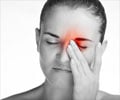Many patients who suffer from migraines avoid taking aerobic exercise because they are afraid that the physical activity may bring on a serious migraine attack.
Many patients who suffer from migraines avoid taking aerobic exercise because they are afraid that the physical activity may bring on a serious migraine attack. Researchers at the Sahlgrenska Academy, University of Gothenburg, Sweden, have now developed an exercise programme that can improve fitness among migraine sufferers without aggravating this painful condition.
Patients who suffer from migraines are often advised to take exercise, but to date no studies have been conducted to show that exercise actually helps guard against migraine attacks. No exercise programme has so far been scientifically proven to be safe for migraine patients. "We know that everyone benefits from a little exercise, but if you're convinced that a session at the gym will end up with you being confined to bed with a thumping headache and nausea then it's hardly surprising that people give it a miss," says Jane Carlsson, Professor in Physiotherapy at the Sahlgrenska Academy.In the study, which is being published in the latest issue of the scientific journal Headache, some twenty migraine sufferers were asked to follow a special exercise programme three times a week for three months. The programme involved using an exercise bike under the guidance of a physiotherapist. "We could see that those who participated in the study were much fitter after the training period, since their ability to absorb oxygen increased considerably," says physiotherapist Emma Varkey, one of the researchers behind the study.
Only one of the patients suffered a migraine attack that was directly linked to the training session."Now that we've been able to show that the risk of increased frequency of attacks in connection with this type of exercise is extremely small, we can study whether exercise can be used to prevent or alleviate migraine attacks. "We have already initiated a new study in which we plan to compare the results against a control group," says Mattias Linde, neurologist at Cephalea Headache Centre and researcher at the Sahlgrenska Academy.
Source-Eurekalert
SRM














